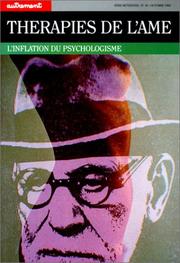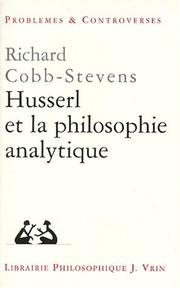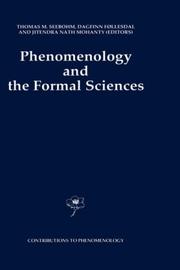| Listing 1 - 10 of 19 | << page >> |
Sort by
|
Book
ISBN: 9782711625994 2711625990 Year: 2015 Publisher: Paris Vrin
Abstract | Keywords | Export | Availability | Bookmark
 Loading...
Loading...Choose an application
- Reference Manager
- EndNote
- RefWorks (Direct export to RefWorks)
Theory of knowledge --- Psychology --- Psychologism --- Psychology and philosophy --- Psychologisme --- Psychologie et philosophie --- Psychologisme. --- Psychologie et philosophie.
Book
ISBN: 9788846722096 8846722094 9788846722096 Year: 2009 Publisher: Pisa : ETS,
Abstract | Keywords | Export | Availability | Bookmark
 Loading...
Loading...Choose an application
- Reference Manager
- EndNote
- RefWorks (Direct export to RefWorks)
Phenomenology --- Psychologism --- Existentialism --- Phénoménologie --- Psychologisme --- Existentialisme --- Husserl, Edmund,

ISSN: 07510144 ISBN: 2862600431 9782862600437 Year: 1982 Volume: 43 Publisher: Paris : Autrement,
Abstract | Keywords | Export | Availability | Bookmark
 Loading...
Loading...Choose an application
- Reference Manager
- EndNote
- RefWorks (Direct export to RefWorks)
Histoire de la psychanalyse --- Psychologie --- Sigmund Freud --- Psychothérapie --- Psychologisme --- Psychothérapie de groupe --- Thérapies corporelles
Book
ISBN: 9780674724570 Year: 2014 Publisher: Cambridge Harvard university press
Abstract | Keywords | Export | Availability | Bookmark
 Loading...
Loading...Choose an application
- Reference Manager
- EndNote
- RefWorks (Direct export to RefWorks)
Philosophical anthropology --- Theory of knowledge --- Affective and dynamic functions --- Psychologisme --- Phénoménologie --- Intentionnalité (philosophie) --- Psychologism. --- Phenomenology --- Intentionality (Philosophy) --- Psychologism --- Phenomenological psychology --- Philosophy, Modern --- Act (Philosophy) --- Mind and body --- Philosophy --- Psychologisme. --- Phénoménologie. --- Phénoménologie. --- Intentionnalité (philosophie)
Book
ISBN: 9782336006680 2336006685 9782336006697 9782336006703 Year: 2013 Publisher: Paris : L'Harmattan,
Abstract | Keywords | Export | Availability | Bookmark
 Loading...
Loading...Choose an application
- Reference Manager
- EndNote
- RefWorks (Direct export to RefWorks)
Sociology --- Social psychology --- Psychologism --- Clinical sociology --- Narrative inquiry (Research method) --- Sociologie --- Psychologie sociale --- Psychologisme --- Sociothérapie --- Histoires de vie

ISBN: 1283328887 9786613328885 9027280878 9789027280879 9027215065 9789027215062 Year: 1981 Publisher: Amsterdam Benjamins
Abstract | Keywords | Export | Availability | Bookmark
 Loading...
Loading...Choose an application
- Reference Manager
- EndNote
- RefWorks (Direct export to RefWorks)
Unlike studies which confine psychologism to the second half of the nineteenth century, and to an explicit claim of psychology as a 'Grundwissenschaft' during that period, this work attempts to trace psychologism's emergence in Greek antiquity, in hedonistic tendencies of the Renaissance, and in British Empiricism. Thus, psychologism figures as a generic concept, embracing a variety of both positivistic and idealistic arguments concerning the localization of normative sciences, particularly aesthetics and literary theory, in psychological space. This study also considers the implicit psychologism of even those psychoaesthetic theories which claimed to be against the exclusive status of psychology. In their actual treatment of aesthetic and literary facts, such theories inadvertently did indeed resort to psychologistic arguments. The position from which I have chosen to look at psychologistically committed aesthetics and literary theory is essentially phenomenological. The author seeks to present psychologism as a central tendency of psychoaesthetics as well as to assert critically psychologism's basic assumptions.
Psychologism. --- Aesthetics --- Phenomenological psychology --- Phenomenology --- Psychological aspects. --- Psychologism --- Psychological aspects --- Psychologisme --- Esthétique --- Aspect psychologique --- Radio broadcasting Aesthetics

ISBN: 2711613542 9782711613540 Year: 1998 Publisher: Paris Vrin
Abstract | Keywords | Export | Availability | Bookmark
 Loading...
Loading...Choose an application
- Reference Manager
- EndNote
- RefWorks (Direct export to RefWorks)
Analysis (Philosophy) --- Phenomenology. --- Psychologism. --- Intuition. --- Philosophie analytique --- Phénoménologie --- Psychologisme --- Intuition --- Husserl, Edmund, --- Criticism and interpretation --- Phénoménologie --- Criticism and interpretation.
Book
ISBN: 8886570899 Year: 2002 Volume: 12-13 Publisher: Macerata : Quodlibet,
Abstract | Keywords | Export | Availability | Bookmark
 Loading...
Loading...Choose an application
- Reference Manager
- EndNote
- RefWorks (Direct export to RefWorks)
Psychologism --- Philosophy, German --- Psychology --- Aesthetics, German --- Psychologisme --- Philosophie allemande --- Psychologie --- Esthétique allemande --- Philosophy --- History --- Philosophie --- Histoire --- Lipps, Theodor, --- Philosophical anthropology --- Anthropologie philosophique

ISBN: 0792314999 9401051380 9401125805 9780792314998 Year: 1991 Volume: 8
Abstract | Keywords | Export | Availability | Bookmark
 Loading...
Loading...Choose an application
- Reference Manager
- EndNote
- RefWorks (Direct export to RefWorks)
Phenomenology --- Logic --- Psychologism --- Phénoménologie --- Logique --- Psychologisme --- Husserl, Edmund, --- Phenomenology. --- Logic. --- Psychologism. --- Phenomenological psychology --- Philosophy, Modern --- Argumentation --- Deduction (Logic) --- Deductive logic --- Dialectic (Logic) --- Logic, Deductive --- Intellect --- Philosophy --- Psychology --- Science --- Reasoning --- Thought and thinking --- Methodology --- Husserl, Edmund --- Phénoménologie --- Husserl, Edmond
Book
ISBN: 9780191750458 9780199594900 0199594902 9780198753025 0198753020 Year: 2012 Publisher: Oxford Oxford University Press
Abstract | Keywords | Export | Availability | Bookmark
 Loading...
Loading...Choose an application
- Reference Manager
- EndNote
- RefWorks (Direct export to RefWorks)
"The Oxford Handbook of Contemporary Phenomenology presents twenty-eight essays by some of the leading figures in the field, and gives an authoritative overview of the type of work and range of topics found and discussed in contemporary phenomenology. The essays aim to articulate and develop original theoretical perspectives. Some of them are concerned with issues and questions typical and distinctive of phenomenological philosophy, while others address questions familiar to analytic philosophers, but do so with arguments and ideas taken from phenomenology. Some offer detailed analyses of concrete phenomena; others take a more comprehensive perspective and seek to outline and motivate the future direction of phenomenology ... It includes discussions of such diverse topics as intentionality, embodiment, perception, naturalism, temporality, self-consciousness, language, knowledge, ethics, politics, art and religion, and will make it clear that phenomenology, far from being a tradition of the past, is alive and in a position to make valuable contributions to contemporary thought."--Publisher's website.
Phenomenology. --- Philosophy, Modern --- E-books --- Phenomenology --- Theory of knowledge --- Phänomenologie. --- Phénoménologie --- Handbooks, manuals, etc. --- Guides, manuels, etc. --- Conscience --- Intentionnalité (philosophie) --- Perception (philosophie) --- Phénoménologie --- Husserl, Edmund --- Psychologisme --- Signification (philosophie) --- Vie
| Listing 1 - 10 of 19 | << page >> |
Sort by
|

 Search
Search Feedback
Feedback About UniCat
About UniCat  Help
Help News
News